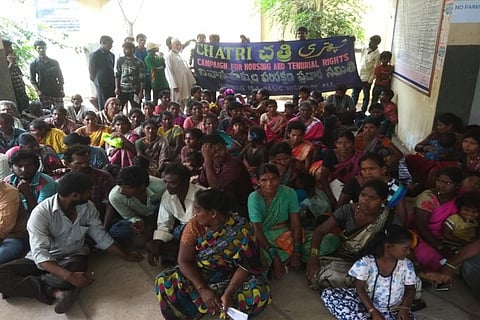

“They came all of a sudden, asked us to leave our houses, and then started destroying our houses with bulldozers. We were not told about this. Now we all are on road with our children, in this rain,” recalls B Sudhakar, who was among the 100 families who resided in tiny huts under the Shivaji bridge in Hyderabad’s Afzal Gunj area. They have now been rendered homeless after local revenue officials evicted them and razed their huts, as these huts were on the banks of Musi River.
These families were evicted on September 25 - the day when Hyderabad received the highest rainfall it had witnessed in recent times. The eviction and rains have disrupted the lives of these slum dwellers.
A majority of these families are from low-income backgrounds and make their livelihood by engaging in rag picking and scrap collection works in the city. With the unprecedented drive of revenue officials, the families are now forced to take shelter on footpaths and roads.
“It has been close to a week,” says Lakshmi, B Sudhakar’s wife. “We are left on the streets in these rains. Our livelihood has also been affected. Earlier, they had assured us of houses under the government’s 2BHK Dignity Housing Scheme, but there has been no progress on that."
The slum dwellers, including the children, with the support of the housing and human rights groups, staged a protest on Tuesday, demanding transit accommodation (or temporary accommodation), besides the immediate rehabilitation process.
While condemning the uninformed demolition drive, the Campaign for Housing and Tenurial Rights (CHATRI), Human Rights Forum (HRF) and Montfort Social Institute (MSI) also demanded access to the place and rehabilitation to the dwellers.
Sanjeev Kumar, tenurial rights activist of MSI said, “The government officials have not informed the dwellers prior to the so-called river conservation drive. They should not evict anyone without giving them rehabilitation."
However, the revenue officials claim that the slum dwellers are encroaching the Musi river bank illegally according to the River Conservation Act, 1984.
Speaking to TNM, Hyderabad Revenue Divisional Officer (RDO) Srinivas Reddy said, “The drive was to restrict illegal encroachments and not to destroy shelters.
When asked about providing rehabilitation and housing facility to slum dwellers, the official said, “We will conduct a socio-economic survey first, and based on that we will take care of it."
Srinivas also said, "We have taken measures to restrict further encroachments on the banks of Musi river.”
However, instead of proving a reasonable transit accommodation, the revenue official told TNM, “We have received their (slum dwellers) representation and have given them access to the place (where they were evicted from).”
When TNM inquired, K Gundaiah, one of the residents, said, “Though the officials have been saying that we will be given access to the place where our slums were, to take temporary shelter, the area has been fenced with nets.”
Thus, in the absence of temporary shelter, these families continue to take refuge on footpaths and roads.